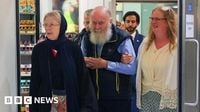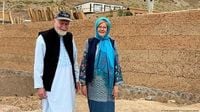After more than seven months in Taliban custody, Peter and Barbie Reynolds—a British couple deeply rooted in Afghan life—finally touched down on UK soil, bringing a harrowing chapter to a close and casting a spotlight on the complex interplay between humanitarian work, international diplomacy, and Afghanistan’s uncertain future.
The Reynolds, aged 80 and 76, were detained by the Taliban on February 1, 2025, under circumstances that remain shrouded in mystery. The Islamist group cited violations of Afghan law but never disclosed the specific allegations against the couple, who had devoted nearly two decades to running education and training programs in Afghanistan’s Bamiyan province. According to BBC News, the couple’s detention lasted nearly eight months, ending only after extensive negotiations and diplomatic intervention by Qatar.
The couple’s ordeal began shortly after the Taliban reclaimed power in August 2021. While most foreigners—and indeed, many Afghans—fled the country amid fears of repression, the Reynolds chose to stay. “We are Afghan citizens,” Barbie Reynolds told Agence France-Presse at Kabul airport after their release. Their commitment to Afghanistan was not just a passing phase; they had married in Kabul in 1970 and spent the last 18 years running charitable training programs, even as the country’s political landscape shifted dramatically around them.
Their educational initiatives, particularly those supporting women and children, stood in quiet defiance of the Taliban’s restrictions on women’s education and employment. Since 2009, they had operated projects in both Kabul and Bamiyan, reportedly with the approval of local Taliban officials after the group’s return to power. Yet, as BBC News highlighted, these approvals offered little protection once the couple fell afoul of the authorities for reasons still unknown.
The family’s campaign for their release was relentless. Their son, Jonathan Reynolds, described the conditions of their detention as dire. In July, he revealed to BBC Radio 4 that his father was suffering from serious convulsions, while his mother was “numb” from anemia and malnutrition. International concern grew, with United Nations human rights experts warning that the couple’s physical and mental health was deteriorating rapidly, placing them at risk of “irreparable harm or even death,” according to Associated Press.
Despite these alarms, the Taliban insisted that the Reynolds received adequate medical care and that their human rights were respected during detention. In the final stage of negotiations, the couple was moved from Kabul’s central prison to a facility with better conditions, a Qatari official told the BBC. After their release, they underwent medical checks in Doha before continuing to London.
The emotional reunion with their daughter, Sarah Entwistle, in Doha on September 19, 2025, was a moment of catharsis for the family. Photographs captured Sarah running to embrace her parents as they stepped off the plane, a poignant counterpoint to the months of uncertainty and fear. “This experience has reminded us of the power of diplomacy, empathy and international cooperation,” Sarah told journalists in Doha, expressing the family’s overwhelming gratitude and relief.
Diplomatic efforts behind the scenes were crucial. Qatar, which has played a pivotal role in mediating between the Taliban and Western governments, was instrumental in securing the Reynolds’ release. Both UK Prime Minister Keir Starmer and Hamish Falconer, the UK’s minister for the Middle East, Afghanistan, and Pakistan, publicly thanked Qatar for its “vital role” and “fruitful cooperation.” Mohammed bin Abdulaziz al-Khulaifi, Qatar’s minister of state at the Foreign Ministry, echoed these sentiments, crediting both the UK and Taliban for their collaboration.
Upon their release, the couple was handed over to Britain’s special representative to Afghanistan, Richard Lindsay. The UK Foreign Office expressed relief and noted that “the UK has worked intensively since their detention and has supported the family throughout.” The Reynolds’ case, as Deutsche Welle and AP suggested, is widely seen as part of the Taliban’s broader effort to gain international recognition and normalize relations with the West. Recent months have seen similar releases, including that of a U.S. citizen in March 2025, as the Taliban seeks to demonstrate a willingness to engage on the world stage.
Yet, the underlying tensions remain. The Taliban’s spokesperson, Abdul Qahar Balkhi, maintained that the couple “violated Afghan law” and were released following a judicial process, but offered no details. “The Taliban does not view the matters of citizens from a political or transactional angle,” Balkhi stated on social media, even as Western governments and human rights groups continue to question the group’s commitment to transparency and due process.
For the Reynolds, the future remains uncertain. Their son Jonathan told the BBC that his parents’ “desire would be to carry on living there and to do the work they were doing.” He described their work as having “a massively positive impact,” with his mother’s reaction to news of their programs’ success being that they still had “more work to do.” But, as Jonathan poignantly asked, “how do you do that in a country where you’re not welcome?”
The UK government, for its part, continues to advise against all travel to Afghanistan, citing the lack of diplomatic presence and the unpredictable security environment. The Foreign Office warns that support for British nationals in Afghanistan is “severely limited.” Nevertheless, the Reynolds’ story is a testament to the enduring ties between individuals and the communities they serve—ties that persist even in the face of political upheaval and personal risk.
The broader context is equally fraught. Afghanistan’s humanitarian needs are vast, with Western aid dramatically reduced since the Taliban’s return to power. The country’s economy is in crisis, exacerbated by natural disasters and ongoing sanctions. Western nations remain wary of providing direct support to the Taliban government, citing ongoing restrictions on women’s rights and personal freedoms.
As the Reynolds settle back into life in the UK, their case serves as a microcosm of Afghanistan’s ongoing struggle for stability, recognition, and international engagement. Their resilience and dedication have drawn admiration, but their ordeal is a stark reminder of the risks faced by those who choose to serve in some of the world’s most challenging environments. For now, the Reynolds are safe, but the fate of Afghanistan—and those committed to its future—remains as uncertain as ever.






